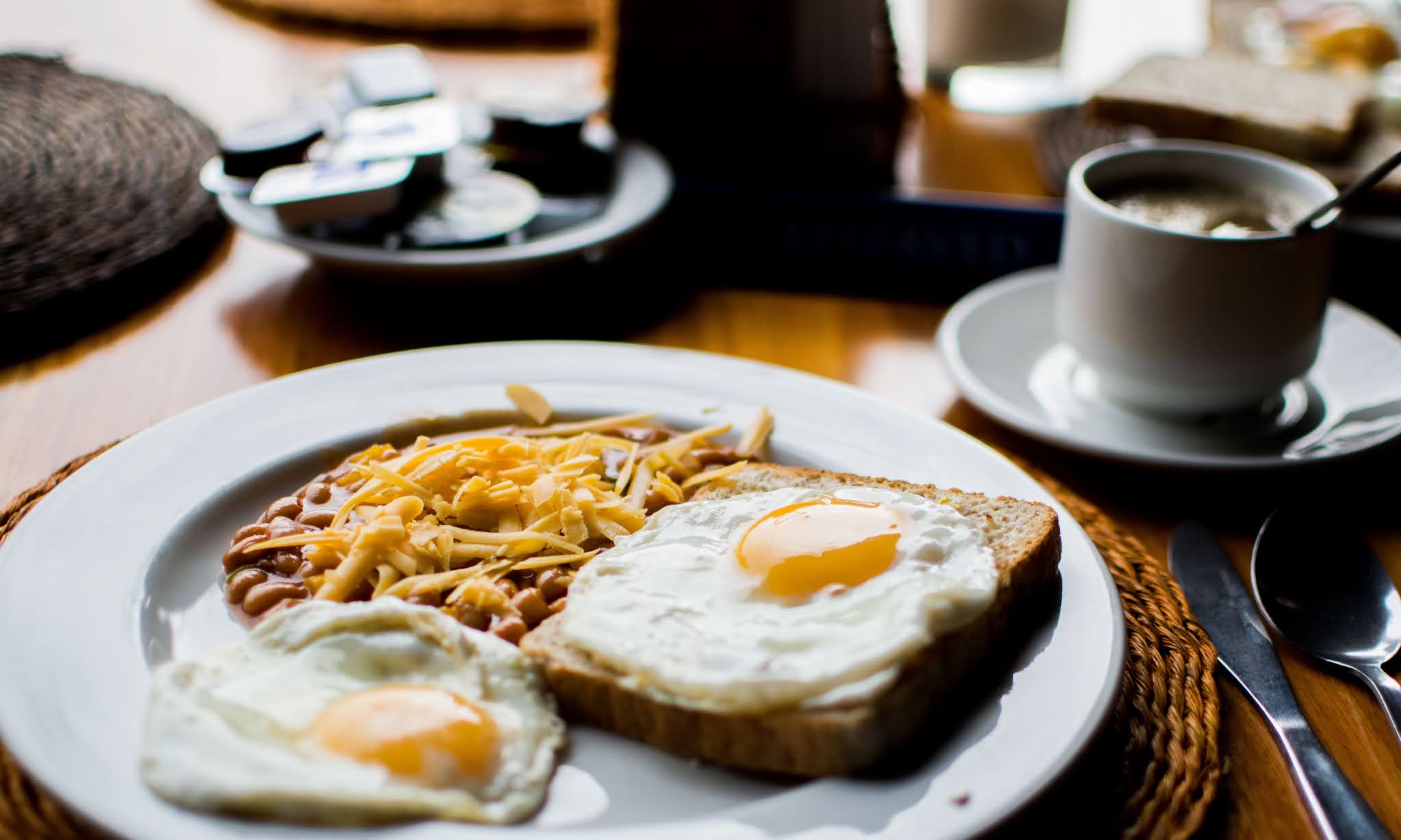21 Things That Happen to Your Body When You Skip Breakfast
21 Things That Happen to Your Body When You Skip Breakfast.
What happens when you skip breakfast? Skipping the morning meal can throw off your body's rhythm of fasting and eating. When you wake up, the blood sugar your body needs to make your muscles and brain work their best is usually low. Breakfast helps replenish it.
Breakfast also gives you a chance to get in some vitamins and nutrients from healthy foods like dairy, grains, and fruits. If you don’t eat it, you aren’t likely to get all of the nutrients your body needs. To eat breakfast or to not eat breakfast—that is the real question. There are those who can't start their day without a bowl of oatmeal or a hearty serving of eggs. And there are others who are grossed out by the thought of any type of food passing their lips before lunch. So, who is right and who is wrong? The shocking answer is that both camps make compelling arguments both for and against the meal once known as the most important of the day. And not eating breakfast doesn't have an all negative effect on your body—there are many positive benefits too.
Here's a breakdown of everything that may happen when you skip breakfast. Just be sure that if you do decide to eat something in the morning, it's not any of The Worst Breakfast Foods You Should Never Start Your Day With.
1
You Put Yourself at Risk for Diseases
According to Kristi King, a senior clinical dietitian at Texas Children's Hospital, breakfast skippers have been found to have a "higher risk of Type 2 diabetes, higher risk of obesity due to insulin resistance and hormone regulation, as well as increased risk for heart attacks and hypertension." Yikes!
2
You Deprive Your Body of Essential Nutrients
"Breakfast is also a great time to get much-needed nutrients into your diet, including fiber and vitamins that get you through the day. So, skipping breakfast may cause you to not consume adequate amounts of them, contributing to long-term health effects as a result. "My advice? Find what works best for you," says King. "If you aren't hungry right away in the morning, wait an hour or two before munching on something for breakfast. This includes fiber, which will help to keep you full throughout the day, as well as help you go to the restroom!" And be sure to sign up for our newsletter to get daily recipes and food news in your inbox!
3
You Wreak Havoc With Your Blood Sugar Levels
Not consuming breakfast can affect your blood sugar levels and make you "hangry"—as in equal parts hungry and angry all at once. Not a pleasant combo for you—nor those around you. "When blood sugars drop, your mood will be affected," says King. "This is a correlation to the drop in blood sugars. Your energy levels will decrease as well as your cognitive function."
4
Your Metabolism Wakes Up
It's been said that you'll burn more calories by eating breakfast and there is some truth to that. "It's the first time you're 'breaking the fast' from sleep, so it wakes your metabolism up. However, it doesn't necessarily mean you will automatically burn more calories," says King.
5
You Get a Yen for Unhealthy Cravings
No breakfast means no energy for your body and no nutrients going to your brain since dinner the night before—which could be in the neighborhood of 12 to 14 hours before. "Even worse, not eating breakfast can also mean making very unhealthy choices—doughnuts, anyone?—at 10:30 a.m., when you suddenly realize you're ravenous," explains fitness trainer Kacy Duke. "Even if you're not a big fan of breakfast, your organs are—and you have to feed them so they can function well. Even if it's just a quick bowl of oatmeal, a berry smoothie, or a hard-boiled egg, eating breakfast is also a good way to front-load your day with nutrients and keep blood sugar levels stable." Our vote goes to overnight oats, which are so easy to make.
6
You're at the Mercy of Just Winging It
"I believe the mental and emotional aspect of doing something positive and healthy for yourself when you first wake up goes a long way for your stability and dedication," explains behavior change specialist and personal trainer Patrick Williams. "Your day can get crazy—and if you leave your eating habits to chance, it's likely that you will reach for quick glucose spiking foods that will harm your long term goals. Proactivity goes a long way!"
7
Your Brain Could Sharpen
Intermittent fasting can actually make you sharper and healthier, according to many doctors and researchers. "Twelve hours or more of fasting switches the body over to ketosis, which is the process of burning fat instead of carbs for fuel," explains Zach Iris of the Gingerhill Farm and Retreat Center. "Fat is a far superior fuel source both for the brain and the body and has the added benefit of making you leaner. So, skipping breakfast can lead to a leaner, healthier, sharper and longer-living you." If you don't eat after 7 p.m. and don't eat again until 8 or 9 a.m., you'll be employing your body's state of ketosis.
8
Your Productivity Goes Up
Some say that skipping breakfast can make you more compliant when it comes to adhering to their nutrition plans. For those who aren't hungry upon waking, eating breakfast can feel forced and uncomfortable. "For some people, skipping breakfast and eating a little later could help with hunger," explains Akash Vaghela of Ultimate Performance City gym in London. "The idea here is you'll eat the same number of meals, but in a small time frame. The benefit here is primarily psychological, yet one which will enhance adherence."
9
Your Aging Process is Reversed
A benefit that happens to your body when you skip breakfast? It helps with anti-aging. "Specifically, improving the natural process called autophagy, which is the 'removal of cellular junk' from your body, is a form of detoxification. An easy way to think about it is to consider it 'house cleaning' for the body," explains Vaghela. "Autophagy clears out faulty parts, cancerous growths, and metabolic dysfunctions, and aims to make our bodies more efficient. It is essential for healthy aging and becomes more important as you grow older. Besides exercise, extended fasts are one of the best ways to accelerate autophagy, as it gives our body time to clear out the debris."
10
Your Cortisol Rises
Science ahead! The brain needs glucose to survive through the night and sometimes there isn't enough stored glycogen in the liver to maintain adequate blood glucose levels. This problem is solved by increasing cortisol levels. "By having breakfast, you refill the liver glycogen levels so that the cortisol levels can decrease. If you don't eat breakfast, then cortisol levels will continue to increase to maintain blood glucose levels eventually causing insulin resistance that makes you more hungry throughout the day," says Dr. Barry Sears, president of the non-profit Inflammation Research Foundation. "Even if you eat breakfast, you still need about 25 grams of protein to maintain satiety. Therefore, a balanced anti-inflammatory breakfast is the ideal way to start the day and continue it without hunger or fatigue." Cortisol has also been proven to make you hang onto belly fat.
11
Your Immunity Goes Down
When you skip breakfast, your immunity goes down. "Periods of fasting appear to trigger damage to the cells and the body needs to be fed food regularly in order to maintain healthy levels of immune cells that fight infections and improve the action of fighter cells (T-cells) in the body," explains Tehzeeb Lalani, a nutritionist with Scale Beyond Scale.
12
Your Levels of Acidity Increase
Not eating breakfast can cause increased bouts of acidity. "The body is mechanized to release acid in the stomach for digestion when the body feels hungry and needs fuel," says Lalani. "If this acid does not get food to process—which it inevitably doesn't if we starve and/or don't eat for several hours—it will surge up to the walls of the nearby areas like the stomach, food pipe, and heart and will lead to acidity."
13
Headaches and Dizziness Begin
Lack of fuel such as glucose to the brain will lead to a decrease in the functioning of the brain cells—which is why you may experience headaches and dizziness when you haven't eaten in a while. Lalani explains, "This is your body's way of communicating with you and asking you to fuel it."
14
You're Missing Out on Protein
"It's beneficial to start your day with a protein-rich breakfast, as opposed to a bag of cereal or blueberry muffin. Consuming some lean protein, such as eggs, protein powder, or plain low-fat Greek yogurt, keeps your energy levels up throughout your day," explains Erin Clifford, a Chicago-based Holistic Wellness Coach. "Additionally, include whole grains and/or fruit and a healthy fat in your meal. For instance, an egg scrambled in one tablespoon of coconut oil atop a piece of sprouted grain toast. A balanced breakfast ensures that you stay satisfied until it is time for your next meal or snack."
15
Good Bacteria Grows
According to microbiologist Kiran Krishnan, skipping breakfast as part of intermittent fasting increases the mucus levels needed for the growth of good bacteria—and elimination of the bad. "Some of this bacteria only grows and thrives when you are fasting. It also drives up the national production of the human growth hormone, which burns fat and improves muscle mass because it uses fat as fuel instead of sugar, and allows your body to rest from producing insulin."
16
Bad Breath Abounds
As if bad breath wasn't already a huge morning problem, your halitosis will only get worse when you skip breakfast. Why is that? There's nothing to neutralize that morning odor when you don't eat something first thing.
17
Hypoglycemia Becomes a Risk
Some people train their bodies to not want breakfast because they're in a hurry for work. "This can result in hypoglycemia down the road," explains holistic nutritionist Kristi Acuna. "We live very stressful lives today, and it's very important to support the demands that we put on our bodies. This means that we need fuel up for at least three meals per day with breakfast being the most important start!"
18
Your Obesity Risk Can Increase
"People who skip breakfast are more than four times as likely to be obese than people who eat something in the morning," says Dan DeFigio, nutrition expert and author of Beating Sugar Addiction For Dummies. "Skipping breakfast makes you fatter because no food in the morning leads to an increased appetite and sugar cravings."
19
Endorphins Are Released
Anytime you skip a meal, especially breakfast, the body releases chemical messengers to stimulate the release of stored energy; this may include the breakdown of muscle mass for immediate energy. "The body perceives this extended fast as starvation and essentially begins to eat itself to survive the 'famine,'" explains Heather Pratt, Master Nutrition Therapist and Board Certified Holistic Nutritionist. "Non-essential body functions such as bone building and memory are impaired. Additionally, this process induces the release of natural painkillers called endorphins, which mask the discomfort that would otherwise be felt. These endorphins make you feel pretty good, which is why many people think they feel good without breakfast, but really the body is struggling to function."
20
Your Cycle Can Be Thrown Off
A 2009 study noted that female college students who consistently skipped breakfast had more menstrual irregularities including painful periods with irregular menstrual bleeds. Ugh! Discover the best and worst foods for your period to make your monthly routine a bit easier on yourself.
21
A Safe Ketogenic State is Entered
By skipping breakfast, you can actually encourage your body to enter a safe ketogenic state, which can expedite the body's natural fat-burning mechanisms by causing your body to dip into fat stores for energy.
Is Skipping Breakfast Bad for You? The Surprising Truth
"Breakfast is the most important meal of the day." This myth is pervasive in society.
Breakfast is perceived as healthy, even more important than other meals.
Even today's official nutrition guidelines recommend that we eat breakfast.
It is claimed that breakfast helps us lose weight, and that skipping it can raise our risk of obesity.
This seems like a problem, because up to 25% of Americans regularly skip breakfast.







Comments
Post a Comment